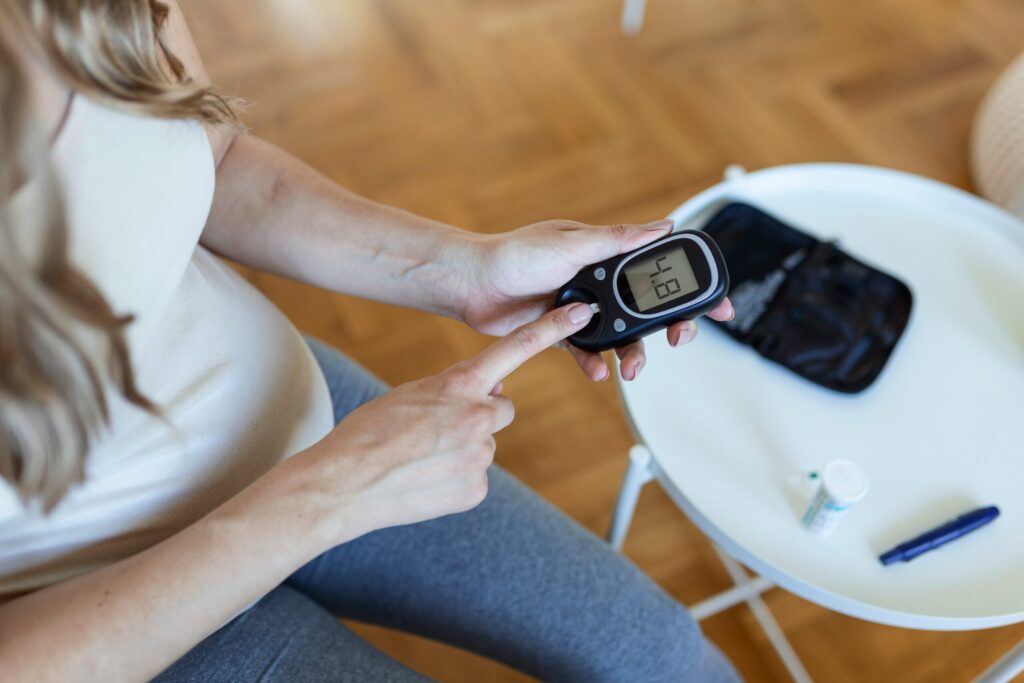When it comes to diabetes in women, hormones play a starring role—sometimes quietly influencing blood sugar levels behind the scenes, and other times making their presence loud and clear.
For women in their 40s and beyond, understanding how hormonal changes—from reproductive years through menopause—affect diabetes risk and management can be empowering. Whether you’re living with diabetes, concerned about prevention, or just trying to make sense of shifting health needs, here’s what every woman should know.
How Oral Contraceptives Affect Diabetes in Women
Oral contraceptives (birth control pills) can influence blood sugar levels due to their effects on estrogen and progesterone. While modern low-dose pills are generally safe for most women, they may slightly increase blood sugar or insulin resistance in some cases—particularly for women who already have prediabetes, diabetes, or other risk factors such as obesity or high blood pressure.
If you have diabetes, it’s important to discuss contraceptive options with your healthcare provider. Non-hormonal methods or lower-dose hormonal options may be better choices. Monitoring your blood sugar after starting any new birth control is wise—small adjustments in diet, activity, or medication might be needed to stay balanced.
The Role of Diet in Managing Diabetes
We’ve all heard that diet matters—but for women managing diabetes, food choices have especially powerful effects. A balanced, fiber-rich diet full of colorful vegetables, lean proteins, and healthy fats helps stabilize blood sugar levels and energy throughout the day.
Avoiding refined carbs and added sugars is crucial, but so is understanding how meal timing impacts glucose control—especially during midlife, when metabolism naturally slows. Eating smaller, balanced meals every few hours can prevent the spikes and crashes that affect both mood and energy.
Additionally, as estrogen levels decline in perimenopause and menopause, the body becomes less sensitive to insulin, increasing the risk of developing type 2 diabetes. Maintaining a healthy diet rich in magnesium, omega-3s, and phytoestrogens (found in flaxseeds, soy, and chickpeas) can help support hormonal balance and blood sugar regulation.
Stress: The Silent Blood Sugar Disruptor
Chronic stress is one of the most overlooked factors in diabetes in women. When you’re stressed, your body releases cortisol—a hormone that raises blood sugar to help you “fight or flee.” But when stress is constant (hello, midlife juggling act), cortisol remains elevated, leading to persistently higher blood sugar and increased insulin resistance.
In midlife, women often face unique stressors—career changes, aging parents, kids leaving home, and menopause symptoms—which can all add up. Incorporating regular stress-reducing practices like mindfulness, yoga, deep breathing, or simply walking outdoors can significantly lower both cortisol and blood sugar levels.
Sleep is also essential. Poor sleep increases cravings for sugary foods and decreases insulin sensitivity. Prioritizing rest isn’t indulgent—it’s medicine.
Pregnancy and the Risk of Gestational Diabetes
Even though pregnancy may be in the past for many women 40 and over, understanding its impact on long-term health is important. Women who experienced gestational diabetes (a type of diabetes that develops during pregnancy) have a higher risk of developing type 2 diabetes later in life.
If that’s you, regular blood sugar monitoring and healthy lifestyle habits are key preventive steps. The good news? Lifestyle changes such as regular exercise, balanced eating, and maintaining a healthy weight can cut your risk dramatically.
Perimenopause, Menopause, and Diabetes
The hormonal changes during perimenopause and menopause can have a profound impact on blood sugar control. As estrogen levels drop, insulin sensitivity decreases, and fat distribution changes—often shifting more toward the abdomen. This can make it harder to manage weight and blood sugar, even if your diet and exercise habits stay the same.
Hot flashes, night sweats, and sleep disturbances can also make it tougher to stay consistent with healthy habits. And when you’re tired, you’re more likely to reach for quick sugar or caffeine boosts, which can send blood sugar soaring.
Women in midlife should have their fasting glucose and A1C levels checked regularly, especially if they have risk factors like family history, excess weight, or prior gestational diabetes. The earlier changes are detected, the more effectively they can be managed through lifestyle adjustments.
Practical Tips for Women in Midlife
- Move daily. Regular activity—especially walking, strength training, or yoga—helps your body use insulin more effectively and supports hormone balance.
- Eat mindfully. Focus on whole foods and avoid processed snacks that cause glucose spikes.
- Manage stress proactively. Meditation, journaling, and laughter all lower stress hormones that affect blood sugar.
- Get consistent checkups. Routine screenings can catch changes early, when they’re easiest to address.
- Prioritize self-care. Rest, hydration, and community connection matter as much as medication or diet.
Diabetes in women is closely linked to hormonal health—and understanding that connection can help you feel more in control. From the impact of oral contraceptives to the challenges of menopause, every phase of a woman’s life brings unique considerations for blood sugar balance.
With mindful choices, regular health check-ins, and a bit of compassion for yourself along the way, you can navigate midlife feeling strong, informed, and empowered—not defined by numbers on a chart, but guided by knowledge and care.
